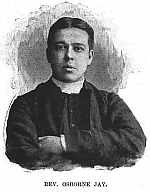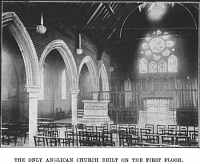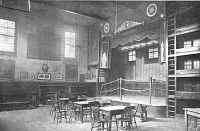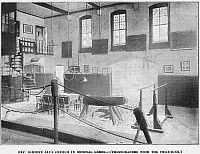To Check the Survival of the Unfit:
A New Scheme by the Rev. Osborne Jay, a Militant Bethnal Green Parson, for Sending the Submerged to a Penal Settlement.
From: "The London", 12th March 1896
[The "wretched
tenements" referred to below were in the area known
as the Old Nichol. It became famous as the Jago in Arthur
Morrison's A Child of the Jago, and it's thought
that Morrison may have named it after the Reverend Jay:
Jay-go.]
 A FEW years ago
the wretched tenements which the County Council is now
razing to the ground in Bethnal-green harbored the most
abandoned characters of London. Crime and immorality ran
riot, and what efforts the clergy and police put forward
to grapple with the deplorable condition of affairs were
of no avail. Nothing remained but to clear the area, and
this the County Council has done at a cost of £300,000.
In the midst of this area however, upon which the new
buildings are being erected, stands the Church of Holy
Trinity, of which the Rev. Osborne Jay is vicar. It
stands where previously existed the worst court in the
worst spot in the metropolis. It is a small church
capable of seating about 400 people, but has cost
£20,000. The church has, however, a very handsome
interior, and was greatly admired by the late President
of the Royal Academy. The chief feature of Holy Trinity
is not the fact that it is the only consecrated church in
England built on the first floor, nor the fact that it is
beautiful, but that in its congregations can be found men
who would not attend any other place of worship. The
secret is in Mr. Jay. He has used common-sense methods of
getting hold of the people. Nine years ago, when he first
went into this awful district, he had no church. It was,
however, necessary that he should have one of some kind,
and after a long search for a suitable building, he
utilised a loft over a row of stables. The loft was
reached by a kind of ladder, and the children could
communicate with the horses below through the holes above
the mangers. In addition to this hay-loft church, Mr. Jay
started a club for men in a cheese and bacon warehouse,
the subscription to which was a penny a week. Here the
men were allowed to smoke and sing, play cards, dominoes,
or bagatelle, indulge in gymnastic exercises, or, with
their fists enclosed in boxing-gloves, punch each other
about to their heart's content. Even with these great
temptations the men were not readily won over, but Mr.
Jay has now gained the success which his energy and
devotion deserve. He has at the present time on this
Boundary-street area, beneath one roof, a church, a
clubroom, a gymnasium, and a lodging-house. The church
is, so to speak, a continuation of the stable loft, and
the club-room an extension of the bacon warehouse. There
are, practically, only three rules which govern the club
life, and they are not very exacting. The fee is a penny
a week ; members must be over 18 years of age, and live
in the district. There are 500 members, and the average
nightly attendance is 150. It will astonish many good
folk to know that there are thieves and loafers among the
patrons of the club. Mr. Jay, however, thinks that they
are better in the club than elsewhere. The lodging-house
is certified to accommodate 92 men, but Mr. Jay will not
take more than 48. With this number the house pays its
way and is not crowded. The fees are half-a-crown a week
for the use of the kitchen and a cubicle, and two
shillings for a bedroom with other lodgers and the common
use of the kitchen. Besides this house, there is also a
free shelter in the club-room, where a few selected
out-of-works are allowed to sleep.
A FEW years ago
the wretched tenements which the County Council is now
razing to the ground in Bethnal-green harbored the most
abandoned characters of London. Crime and immorality ran
riot, and what efforts the clergy and police put forward
to grapple with the deplorable condition of affairs were
of no avail. Nothing remained but to clear the area, and
this the County Council has done at a cost of £300,000.
In the midst of this area however, upon which the new
buildings are being erected, stands the Church of Holy
Trinity, of which the Rev. Osborne Jay is vicar. It
stands where previously existed the worst court in the
worst spot in the metropolis. It is a small church
capable of seating about 400 people, but has cost
£20,000. The church has, however, a very handsome
interior, and was greatly admired by the late President
of the Royal Academy. The chief feature of Holy Trinity
is not the fact that it is the only consecrated church in
England built on the first floor, nor the fact that it is
beautiful, but that in its congregations can be found men
who would not attend any other place of worship. The
secret is in Mr. Jay. He has used common-sense methods of
getting hold of the people. Nine years ago, when he first
went into this awful district, he had no church. It was,
however, necessary that he should have one of some kind,
and after a long search for a suitable building, he
utilised a loft over a row of stables. The loft was
reached by a kind of ladder, and the children could
communicate with the horses below through the holes above
the mangers. In addition to this hay-loft church, Mr. Jay
started a club for men in a cheese and bacon warehouse,
the subscription to which was a penny a week. Here the
men were allowed to smoke and sing, play cards, dominoes,
or bagatelle, indulge in gymnastic exercises, or, with
their fists enclosed in boxing-gloves, punch each other
about to their heart's content. Even with these great
temptations the men were not readily won over, but Mr.
Jay has now gained the success which his energy and
devotion deserve. He has at the present time on this
Boundary-street area, beneath one roof, a church, a
clubroom, a gymnasium, and a lodging-house. The church
is, so to speak, a continuation of the stable loft, and
the club-room an extension of the bacon warehouse. There
are, practically, only three rules which govern the club
life, and they are not very exacting. The fee is a penny
a week ; members must be over 18 years of age, and live
in the district. There are 500 members, and the average
nightly attendance is 150. It will astonish many good
folk to know that there are thieves and loafers among the
patrons of the club. Mr. Jay, however, thinks that they
are better in the club than elsewhere. The lodging-house
is certified to accommodate 92 men, but Mr. Jay will not
take more than 48. With this number the house pays its
way and is not crowded. The fees are half-a-crown a week
for the use of the kitchen and a cubicle, and two
shillings for a bedroom with other lodgers and the common
use of the kitchen. Besides this house, there is also a
free shelter in the club-room, where a few selected
out-of-works are allowed to sleep.
 In church work
Mr. Jay has been singularly successful. Every Sunday the
church is crowded at all services, and over 1,800
communions were made during the year by the poor and
ignorant parishioners. There are Sunday- schools with an
aggregate of 1,000 scholars, who, twice on Sundays, pack
the church to the doors. But Mr. Jay does not only feed
the children spiritually, on Sunday mornings he gives
some hundreds of them a free breakfast, and prevents, in
this way, the poor mites from sitting hungrily through
the school hours. Mothers' meetings are held on Tuesday
and Thursday afternoons; there are about 600 members. At
present Mr. Jay employs sisters from Kilburn, but when
the new mission-house is built, at a cost of £5,000,
there will be room for resident sisters. The building
will also contain two large halls each seating 300
people, several smaller rooms for general purposes, and a
bath-room where mothers can wash their children.
In church work
Mr. Jay has been singularly successful. Every Sunday the
church is crowded at all services, and over 1,800
communions were made during the year by the poor and
ignorant parishioners. There are Sunday- schools with an
aggregate of 1,000 scholars, who, twice on Sundays, pack
the church to the doors. But Mr. Jay does not only feed
the children spiritually, on Sunday mornings he gives
some hundreds of them a free breakfast, and prevents, in
this way, the poor mites from sitting hungrily through
the school hours. Mothers' meetings are held on Tuesday
and Thursday afternoons; there are about 600 members. At
present Mr. Jay employs sisters from Kilburn, but when
the new mission-house is built, at a cost of £5,000,
there will be room for resident sisters. The building
will also contain two large halls each seating 300
people, several smaller rooms for general purposes, and a
bath-room where mothers can wash their children.
After nine years' work amongst the most desperate and
depraved characters in London, Mr. Jay's opinions on the
solution of the great social problem are full of
interest. In an interview with Mr. Jay on this subject a
representative of this journal asked:
"What do you think was the great cause of the
degradation which used to exist here, Mr. Jay ?"
"There were, no doubt, several reasons, but it is
my opinon that poverty was the chief. There is no
temptation like that of poverty. It is the greatest that
can fall in the way of any man or woman. It fills our
prisons and turns honesty into crime and virtue into
dishonor. But it must also be remembered that at the very
outset of our social problem we are met by the
incontrovertible fact that the major portion of the
submerged and semi-criminal class are in their present
position through physical, moral, and mental
peculiarities. They have no nerve nutrition, no energy or
staying power. Again, their natural gifts are small.
Cunning, not wisdom ; sharpness, not intelligence, are
stamped even on their faces. And yet all the time the
well-to-do virtuous classes, walled off from temptation,
surrounded by all that conduces to right living, wrap
themselves in the wretched mantle of their detestable
hypocrisy and pretend to believe that all in this life
have equal chances, and must be uniformly fairly judged.
But science in unmistakable accents teaches the reverse.
It is easy to talk about laziness and lack of thrift, and
to moralise over opportunities lost or power misapplied,
but we forget that there is this large class which never
had a fair chance of being quickened into life."
"But in what way do you think the problem can be
solved ?"
 "There
is, it seems to me, only one solution to this problem.
Education has failed, religious work cannot he expected
to do what is needed, the Poor Law and prison systems are
alike ineffective, and universal charity cannot rightly
be considered a real factor in the case. The only method,
I think, is to stop the supply of persons born to be
lazy, immoral, and deficient in intellect. This can only
be done by sending the present stock of them to what I
will call a penal settlement. The submerged constitute a
peculiar separate class, and yet people are so afraid of
weakening individual responsibility that, though they may
be forced to agree to these things, they persist in going
on with the dreary old routine of injustice which we have
inherited from our forefathers. We have with us a large,
miserable, and costly class, which, by our own folly,
increases daily. Are we merely to please ourselves and
satisfy our own idle inherited theories - to go on
treating them as exactly like everybody else ? The fact
is, all men are not equal, nor can they be treated as
such. This, through no fault of their own, I grant; but
we can prevent them bringing into the world children
stamped with the character of their parents."
"There
is, it seems to me, only one solution to this problem.
Education has failed, religious work cannot he expected
to do what is needed, the Poor Law and prison systems are
alike ineffective, and universal charity cannot rightly
be considered a real factor in the case. The only method,
I think, is to stop the supply of persons born to be
lazy, immoral, and deficient in intellect. This can only
be done by sending the present stock of them to what I
will call a penal settlement. The submerged constitute a
peculiar separate class, and yet people are so afraid of
weakening individual responsibility that, though they may
be forced to agree to these things, they persist in going
on with the dreary old routine of injustice which we have
inherited from our forefathers. We have with us a large,
miserable, and costly class, which, by our own folly,
increases daily. Are we merely to please ourselves and
satisfy our own idle inherited theories - to go on
treating them as exactly like everybody else ? The fact
is, all men are not equal, nor can they be treated as
such. This, through no fault of their own, I grant; but
we can prevent them bringing into the world children
stamped with the character of their parents."
"But what is the nature of the settlement you
propose, Mr. Jay?"
 "It
would be a settlement where the class I have spoken of
should be kept for life. In many respects it would
resemble a prison, only, of course, larger and far less
gloomy. It should be possessed of all appliances for
physical development and well-being, gardens, covered
promenades, a gymnasium, and baths of all descriptions,
recreation rooms, reading rooms, and even a theatre and
concert room. The inmates should be treated as well as,
say, the inmates of Hanwell. In such a place there would
necessarily be the possibility of recourse to punishment,
solitary confinement, or even an application of corporal
punishment, but I think the inmates could be ruled
without punishment. It is one thing to go to prison for a
few years, and quite another to settle down in a penal
settlement for life, especially as the latter would offer
every incentive to good conduct. To the submerged
temperament such a place would be the best home they had
ever known, and in time it might be that poor creatures,
acknowledging their own weakness, knowing the dreary
bitterness of the past, would gladly, many of them, be
put where they would lose some liberty, but gain a better
and perhaps a happier life. The officers of the
settlement would have to be chosen wisely and trained
carefully. Human sympathy would be, perhaps, their most
necessary qualification. No nobler surrender could be
imagined than that which would bring those in easy and
comfortable circumstances to look on it as an honor to
serve in any capacity these the least of their
brethren."
"It
would be a settlement where the class I have spoken of
should be kept for life. In many respects it would
resemble a prison, only, of course, larger and far less
gloomy. It should be possessed of all appliances for
physical development and well-being, gardens, covered
promenades, a gymnasium, and baths of all descriptions,
recreation rooms, reading rooms, and even a theatre and
concert room. The inmates should be treated as well as,
say, the inmates of Hanwell. In such a place there would
necessarily be the possibility of recourse to punishment,
solitary confinement, or even an application of corporal
punishment, but I think the inmates could be ruled
without punishment. It is one thing to go to prison for a
few years, and quite another to settle down in a penal
settlement for life, especially as the latter would offer
every incentive to good conduct. To the submerged
temperament such a place would be the best home they had
ever known, and in time it might be that poor creatures,
acknowledging their own weakness, knowing the dreary
bitterness of the past, would gladly, many of them, be
put where they would lose some liberty, but gain a better
and perhaps a happier life. The officers of the
settlement would have to be chosen wisely and trained
carefully. Human sympathy would be, perhaps, their most
necessary qualification. No nobler surrender could be
imagined than that which would bring those in easy and
comfortable circumstances to look on it as an honor to
serve in any capacity these the least of their
brethren."
"How would you define what persons are suitable
for inmates of this settlement, Mr. Jay?"
"It could, I think, be easily settled that any
one convicted the second or third time, even for
stealing, could be made the subject of a careful
examination by a hoard of experts in criminal
anthropology, both physical and psychical. Their
unbiassed unanimous judgment on any given case would
carry certain conviction to the mind of all thinking
persons."
"But would there not be a great outcry against
shutting human beings off from all contact with the
outside world?"
"No doubt; but the public must be educated to the
idea. But it can scarcely be rationally argued that
society has a right to condemn criminal lunatics and
others to life-long imprisonment, and yet possess no
authority to act in a similar preventive manner as
regards the semi-criminals of our everyday experience.
There could of course be reformatories as well as penal
settlements; but freedom is not licence, and it is, on
the whole, a thousand times more humane to place persons
who possess no power of guiding themselves where they can
neither harm themselves nor other people. The new method
sounds drastic and harsh, but it must be remembered that
a virulent fever cannot be cured by doses of treacle. The
time has come when something must be done : why not at
least try this new method, which seems to promise and
portends so much?"
Reprinted with permission of David Rich, Tower Hamlets History On Line.